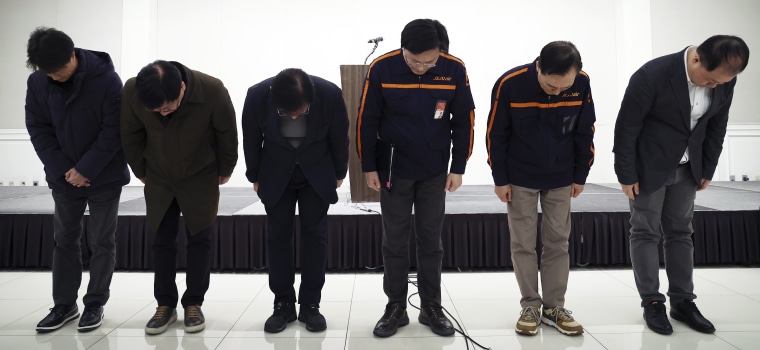At least 174 dead as toll rises
Reporting from Seoul, South Korea
The death of 174 people has been confirmed by the national fire agency.
Airline CEO apologizes for the crash
The chief executive of Jeju Air, Kim E-Bae, apologized over the crash and extended his condelences to the families who lost their loved ones.
“Regardless of the cause, I take full responsibility as the CEO,” Kim was quoted by South Korea’s Yonhap news agency as saying.
Kim and his colleagues bowed in an apology at a news conference.

167 have been confirmed dead
Reporting from Seoul, South Korea
The national fire agency have confirmed the death toll at 167 so far. Officals are raising the death toll as victims arrive at the morgue, and the number is expected to rise.
Of the victims, 79 were men, 77 women and 11 others whose genders weren’t immediately identifiable.
Aircraft ‘completely destroyed’ by fire, officials say
Reporting from Seoul, South Korea
The Jeju Air Boeing 787 has been “completely destroyed by fire,” Joo Jong-wan, the Director of the Aviation Policy Division at South Korea’s transport ministry said at a briefing.
So far, two people — both cabin crew members — have been rescued, Joo said, and the runway at Muan International Airport will be closed until at least the morning of Jan. 1. Among the passengers were two were Thai nationals, he added.
Joo said investigators have retrieved both the flight data recorder and cockpit voice recorders, which will be key to providing insights into the last moments of the fatal landing.
The full investigation could take between six months to three years, he added.
Jeju Air crash deadliest of the year, first in the history of the airline
Death toll rises to 151
Reporting from Seoul, South Korea
The death toll from the crash has risen to 151, according to local authorities.
Boeing extends its condolences
The Jeju Air flight was a Boeing 737-800, carrying 181 passengers and crew.
A timeline of the the sequence of events leading to the disaster
Reporting from Seoul, South Korea
“The pilot declared mayday after issuing the bird strike alert,” Joo Jong-wan, director of the Aviation Policy Division at South Korea’s Ministry of Land, Infrastructure and Transport said, adding that the aircraft was “completely destroyed” in the crash.
The plane initially tried to land on the airport’s Runway 1, but the pilot was told to instead land on Runway 19 — in the opposite direction — due to a bird strike warning, Joo said.
A minute later, the pilot sent a mayday signal following the bird strike and tried to land on Runway 19. While passing over the runway, the plane struck a safety system called a localizer — which provides guidance during landing — failed to lower the landing gear and crashed into a wall, Joo said.
Death toll rises to 127 after plane crashes at South Korean airport
Reporting from Seoul, South Korea
At least 127 people died when a commercial airplane crashed Sunday at a South Korean airport, officials said.
The Jeju Air flight veered off a runway while landing at Muan International Airport and caught fire after the crash, a spokesperson for the country’s National Fire Agency said.
The flight, which originated from Bangkok, was carrying 175 passengers and six crew members, said Joo Jong-wan, director of the Aviation Policy Division at South Korea’s Ministry of Land, Infrastructure and Transport. At least two of the passengers were Thai, Joo said.
“We suspect that the accident may have been due to the breakdown in the malfunctioning landing gear,” Lee Jung-hyun, the head of the Muan Fire Department, said at a briefing. Lee said a bird strike and adverse weather also appeared to have played a role but cautioned that the exact cause is still under investigation.
“The pilot declared mayday after issuing the bird strike alert,” Joo said, adding that the aircraft was “completely destroyed” in the crash.

